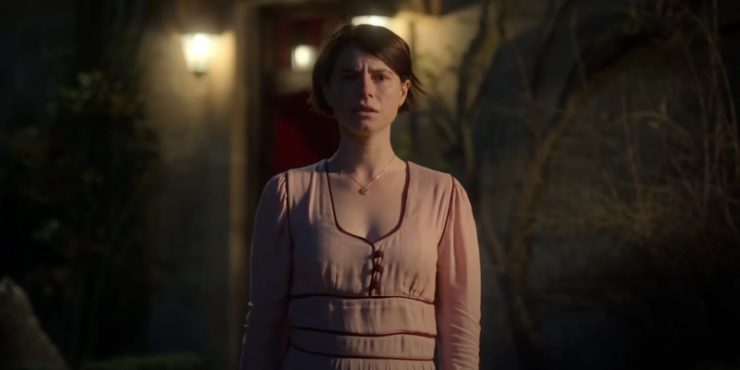When our long-suffering heroine, Harper Marlowe (played by Jesse Buckley), arrives at her holiday cottage in the countryside, she sees an apple tree. Picking one off the branch, she takes a bite, instantly recalling Eve and her consumption of the forbidden fruit (in case you miss it, a character later references it directly). A little bit later, she is walking down a trail before entering a long, dark, daunting tunnel. At first in awe of its acoustic wonder, she becomes frightened when she sees a figure arise in the shadow. In about twenty minutes, Harper goes from Eve to Alice falling down the rabbit hole, broaching into a vivid nightmare with no end in sight. If these religious and literary allusions feel a bit on-the-nose, you’re not wrong, and it’s only a warm-up of things to come: metaphors so heavy-handed it’s impossible for this film to ever truly get off the ground.
The first hour of Men is actually a sufficiently creepy suspense film about a woman entrapped in a truly terrifying situation. Harper has lost her husband, James (played by Paapa Essiedu in flashbacks), who committed suicide after she asked for a divorce. Emotionally manipulative and physically abusive, James’ attempts at psychological blackmail drive Harper further away, until he throws himself from her flat’s terrace. The tragic finale to a troubled marriage leaves her in much need of a vacation. The cottage in Cotson has multiple rooms and various windows with generous views of the lush greenery outside. There’s a large bathtub and a baby grand piano. The heavy, wooden doors creak with character and the centuries-old architecture brings the comfort she hopes can help heal her pain and ease her trauma.
The cottage is owned by Geoffrey (Rory Kinnear). He boasts of his village’s modest offerings (a church! a pub!) while touring the home and showing all it has to offer. He explains that he’s right down the road if she needs anything. At first glance, Harper’s stay is idyllic and peaceful, until her visit to the tunnel and her first encounter with a feral naked man (also played by Kinnear) who follows her all the way back to the house. She calls the police and an officer (Kinnear again) comes and arrests him. Troubled by the trespassing, but trying to keep her hopes of a relaxing holiday alive, she keeps venturing through the village. At the local church, she runs into a caustic adolescent boy (Kinnear’s face CGI’d on a young boy’s body), before having a chat with the local vicar (you guessed it). All these men present various threatening auras which unsettle Harper before wrecking havoc on the house and her stay.
There’s a scene in the middle of the film where Harper visits a pub and we’re treated to a parade of Rory Kinnears, playing the bartender, Geoffrey, and other various riff-raff patronizing the bar. Kinnear is a talented performer and his reputation as a character actor makes him particularly good for this kind of multi-faceted role. But his everyman persona doesn’t exactly mean he’s meant to play literally every man. Scenes like the one in the pub, and others later in the film, play more like a sinister version of Eddie Murphy’s Klumps than anything truly terrifying. This emotional horror film finds much scarier visuals with the brooding sculptures of a church and even the stark lighting of an apple tree. Kinnear playing half a dozen characters lends more towards Men‘s unfortunate turns toward unintentional comedy.
Which brings me to the film’s conclusion, which I won’t spoil here, but I must say is one of the most baffling sequences I’ve ever seen in a supposedly serious film. The movie’s central premise is anti-patriarchal and explicitly so, but the way writer-director Alex Garland chooses to manifest this is not only grotesque but fitfully misguided. By the time we got to the end, my entire theater was cackling with laughter for the absurdity of what we were watching. Garland has been writing novels and screenplays for decades, but this is only his third directorial effort. His first two films, Ex Machina and Annihilation, also suffer from a lack of subtlety but they work because there is a clarity of purpose in their stories and their visual style. Men wants to be a bruising horror film, but it collapses under the weight of its own metaphor.
Jessie Buckley is a tremendous actress, and there’s nothing in Men that persuades me otherwise, even if I think that a grieving, abused widow isn’t really the greatest use of her time and talent. Her and Kinnear are committed to this film’s unhinged sense of righteousness, but that unfortunately doesn’t serve the film or their performances. It’s hard for anybody involved in this film not to come out the other side looking ridiculous. Garland shows glimpses of the striking visual eye he’s flashed in his previous films. Disturbing imagery works well in his hands and a lot of his best scenes are the ones where his characters don’t speak. In his better films, Garland masterfully cut this imagery against strong dramatic storytelling. Men does not have the same solid base, and it really feels lost, unfolding into a stranger and stranger film, unsure how to restrain itself into something competent.
Written and Directed by Alex Garland










